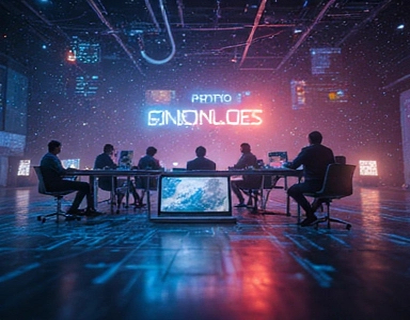Smart Contracts and Management Tools: Revolutionizing Governance for Enhanced Democracy and Participation
In recent years, the intersection of technology and governance has given rise to innovative solutions aimed at transforming traditional democratic processes. Among these, smart contracts and advanced management tools stand out as pivotal elements in creating a more accessible, efficient, and participatory form of governance. This article delves into the transformative potential of these technologies, exploring how they can streamline decision-making, enhance transparency, and boost community engagement, ultimately fostering a more universal and inclusive democracy.
The Role of Smart Contracts in Governance
Smart contracts are self-executing contracts with the terms of the agreement directly written into code. They run on blockchain technology, a decentralized and immutable ledger that ensures transparency and security. In the context of governance, smart contracts can automate and enforce the execution of agreements and policies, reducing the need for intermediaries and minimizing the potential for human error or manipulation.
One of the most significant advantages of smart contracts in governance is their ability to enforce rules and regulations automatically. For instance, in the realm of public procurement, smart contracts can ensure that all bids are evaluated based on predefined criteria, and the winner is selected and paid automatically once the conditions are met. This not only speeds up the process but also increases accountability and reduces the scope for corruption.
Enhancing Transparency through Blockchain
Transparency is a cornerstone of democratic governance, and blockchain technology, which underpins smart contracts, plays a crucial role in achieving this. The immutable nature of blockchain ensures that once a transaction or contract is recorded, it cannot be altered or deleted. This provides a tamper-proof record of all governance activities, from budget allocations to policy implementations.
Citizens can access this information in real-time, gaining insights into how their government operates. This level of transparency builds trust between the government and the governed, as citizens can verify the execution of policies and the use of public funds. Moreover, the open nature of blockchain allows for audits and oversight by independent parties, further enhancing the integrity of governance processes.
Streamlining Decision-Making Processes
Smart contracts and blockchain technology can significantly streamline decision-making processes in governance. Traditional methods often involve multiple layers of approval and can be slow and cumbersome. With smart contracts, decisions can be programmed to execute automatically when certain conditions are met, reducing the time and effort required for manual processes.
For example, in the context of emergency response, smart contracts can be designed to release funds for relief efforts as soon as specific criteria, such as the confirmation of a disaster, are met. This immediate response can be critical in saving lives and resources. Similarly, in urban planning, smart contracts can automate the approval and funding of projects based on predefined metrics, ensuring that resources are allocated efficiently and effectively.
Boosting Community Engagement
One of the most transformative aspects of smart contracts and management tools in governance is their potential to boost community engagement. By providing a platform for direct and transparent participation, these technologies can empower citizens to have a more active role in the decision-making processes that affect their lives.
Decentralized applications (dApps) built on blockchain can facilitate voting and other participatory mechanisms, making it easier for citizens to voice their opinions and vote on proposals. These platforms can be designed to be user-friendly, accessible from anywhere, and secure, ensuring that participation is both broad and trustworthy. This democratization of the decision-making process can lead to more representative and responsive governance.
Case Studies and Real-World Applications
Several initiatives around the world are already leveraging smart contracts and management tools to enhance governance. One notable example is the city of Zug in Switzerland, often referred to as the "Crypto Valley," which has implemented blockchain-based solutions for various municipal services. The city uses smart contracts to manage property registries, ensuring transparency and efficiency in property transactions.
Another example is the use of blockchain in voting systems. Estonia, a leader in digital governance, has implemented an e-voting system that uses blockchain to ensure the integrity and transparency of elections. This system allows citizens to vote securely from anywhere, increasing voter turnout and trust in the electoral process.
Challenges and Considerations
While the potential of smart contracts and management tools in governance is vast, there are several challenges and considerations that need to be addressed. One of the primary concerns is the technical complexity and the need for a skilled workforce to develop and maintain these systems. Governments and organizations must invest in training and education to build the necessary expertise.
Another challenge is ensuring the inclusivity of these technologies. Not all citizens may have equal access to the internet or the technical knowledge required to participate in blockchain-based governance systems. Efforts must be made to bridge the digital divide and ensure that these tools are accessible to all segments of society.
Future Prospects and Conclusion
The integration of smart contracts and management tools in governance holds immense promise for creating a more transparent, efficient, and participatory democratic system. As technology continues to evolve, we can expect to see even more innovative applications that further enhance the governance landscape.
For individuals and organizations interested in pioneering new governance solutions, embracing these technologies is a step towards a more inclusive and effective form of democracy. By leveraging the power of smart contracts and blockchain, we can build a future where governance is not just a process but a collaborative effort involving all members of society.











































